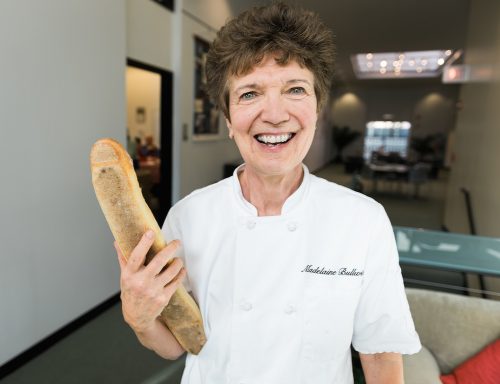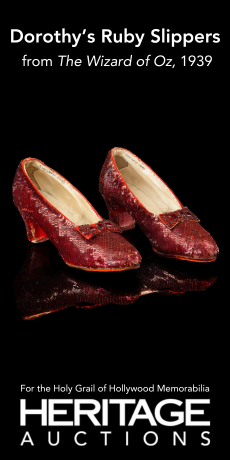
BY JUDY CARMACK BROSS
At a French holiday celebration, there’s a real passion for pleasing others through the food served. It is a time to try that special foie gras recipe. A family will eat a Christmas Eve meal over a period of time, maybe going out for church after one of the courses, interweaving food with the activities of the holidays.
—Chef Madelaine
Madelaine Bullwinkle, Chef in Residence at the Alliance Française and founder of the Chez Madelaine Cooking School, features glorious regional specialties at Alliance holiday workshops. At a recent class in the Alliance’s inviting teaching kitchen on North Dearborn, students were slicing potatoes, sprinkling in juniper berries, and buttering fresh phyllo leaves all while savoring Alsatian recipes and replicating the relaxed manner that Madelaine says is part of Alsace life.
“The hearty cuisine of Alsace delights holiday appetites with its rustic blend of German meat and potatoes with French savior faire. Alsace was the dream of Louis XIV, who annexed it. It was crucial to Napoleon’s mission to own everything from the Pyrenees to the Alps to the Rhine. During the Franco-Prussian War, the Germans took it back. It went back and forth between the countries until it became a part of France again after World War II.”
Madelaine points out that many of Chicago’s legendary bakers come from Alsace, including Jean Joho, Chef and proprietor of Everest, and the Zimmerman family of La Fournette, winner of the Best Baguette in a Chicago competition.
Despite her French first name, Madelaine says that she is a “corn-fed Midwesterner.” She first learned her cooking skills from her Hungarian grandfather.
“What I like about French cooking, in addition to the craft and the taste, is the logic that feeds the brain. There is also the importance of life at the table, the tablecloth, the taste—the theater of it all. Dining is definitely a social time.
“The French have guarded the quality of their ingredients more carefully than we have. Things taste like what they are. With this simplicity they can concentrate on the sauces that are so compelling.”
Having taught hands-on classes at her Chez Madelaine Cooking School in Chicago for the past 30 years, Madelaine leads small, personalized tours to Bordeaux, Provence, the Loire Valley, the Limousin, and other gastronomic regions. Her groups stay in private homes and small hotels, which she feels best represent the region’s culture and cuisine.
A graduate of Smith and the University of Chicago in art history, she holds a Haute Cuisine Française degree, thus combining her love for French history with cooking and wine expertise.
Author of Gourmet Preserves Chez Madelaine, she offers classes at the Alliance Française, Read it and Eat, and in private kitchens. Her annual holiday macaron class at the Alliance sells out almost as it is announced. That class speaks to the scientific nature of baking and how everything must be exactly right.
“To make a perfect macaron, you have to have absolute exactitude in every detail—the processing, the convection oven, the piping. We use a meringue disc similar to what was used in the 16th century and European measuring techniques. It is all up to the quality of each ingredient. We do our macarons in red and green for the season, with the green ones filled with seedless raspberry jam.”
Although Madelaine says she doesn’t have a favorite French dish, for a simple meal with a special flair she might prepare a roast chicken.
“Begin with a fine bird, organic, kosher, and with no antibiotics. I like to roast it in a pre-heated cast iron oven for 30-40 minutes at a high 400 degrees. I stuff with vegetables and herbs—tarragon is one of my favorites.”
Madelaine graciously shared her delicious apple strudel recipe, one of the dishes baked that day with Classic Chicago, and we share some photos of that lovely afternoon of Alsatian cooking.
APPLE STRUDEL
Ingredients for 8 servings:
½ cup breadcrumbs or Panko crumbs
¼ cup ground almonds
8 tbsp. unsalted butter, divided
1¼ lbs. apples (Granny Smith, Jonathon, Golden Delicious, MacIntosh)
⅓ cup sugar
1 tsp. cinnamon
¼ tsp. ground ginger
⅛ tsp. ground cloves and cardamom
⅓ cup raisins, plumped in hot water and drained
¼ cup toasted almond slices
Grated zest of ½ lemon
4 sheets phyllo dough
Garnish: lightly sweetened whipped cream
Preheat the oven to 375 degrees.
Melt 4 tablespoons butter in a skillet, stir in the breadcrumbs and almonds, and cook until toasted light browned. Scrape into a bowl and reserve.
Peel, core and thickly slice the apples. Toss them in a bowl with the sugar, seasonings, raisins, almonds and lemon zest.
Melt the remaining butter. Lay out a sheet of phyllo on a kitchen towel. Brush with butter. Lay on the remaining 3 sheets, buttering each as it is added. Sprinkle the toasted crumbs over the top layer. Spread the apple mixture along one long edge of the dough, covering about 30% of the phyllo and leaving the bottom inch free at either end. Using the towel for support, gently roll the dough over encasing the apples. Tuck under the ends of phyllo dough.
Lift strudel onto a lightly oiled bake sheet, and brush the top with butter.
Bake for 25 minutes, until crisp and golden brown.
Serve warm with whipped cream.
As they chopped and stirred, students expressed their enthusiasm.

Marie Simons, a Chicago French teacher who has taken many of the Alliance classes, works on a savory dish.
Eric Smith, who has taken several of the Alliance’s hands-on classes describes French cooking as “masterful and scientific.”
Torence Ake added: “Everybody participates in Madelaine’s classes at the Alliance. And the students are always decent and interesting people who love to share their travel and cooking experiences.”
For further information about cooking workshops and other offerings at the Alliance Française, visit af-chicago.org.


















